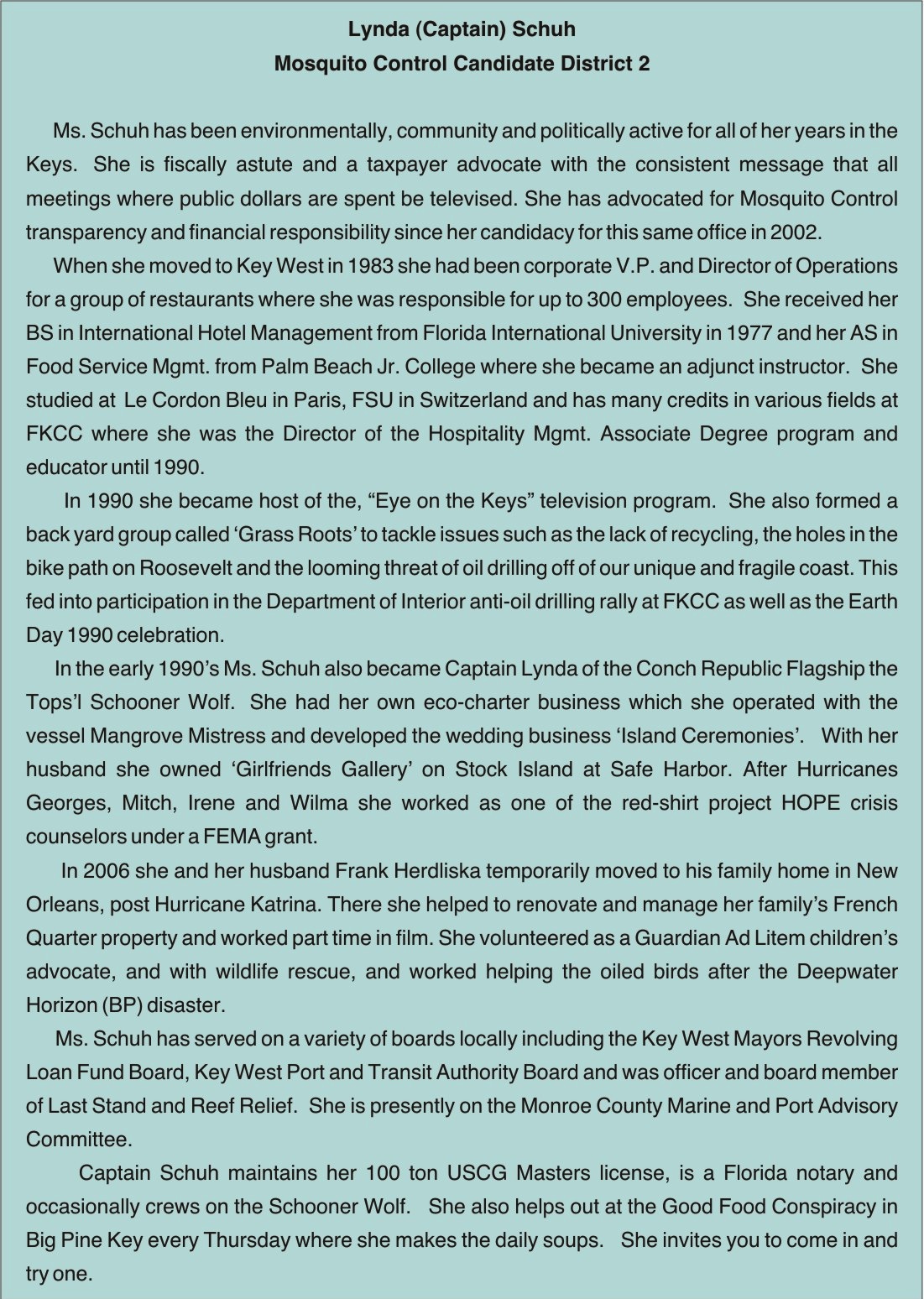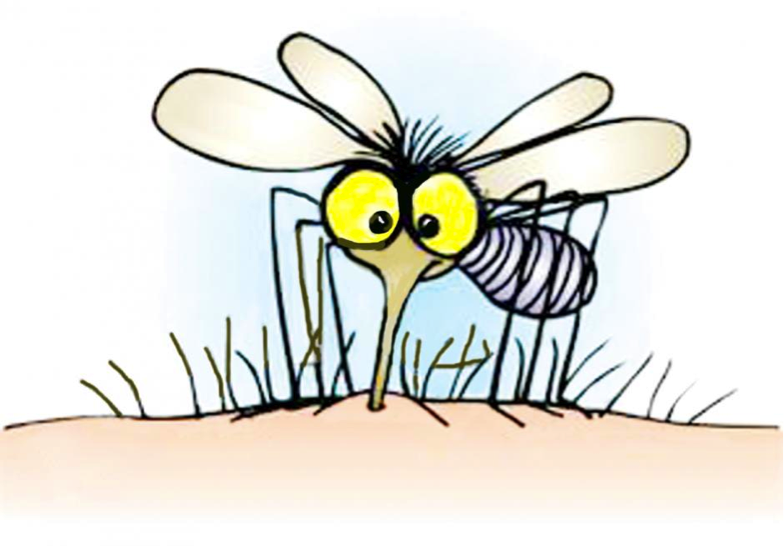GUEST COLUMN: Mosquito Control in the Florida Keys
 I would be remiss as a candidate for the mosquito control board if I did not address the potential threat of the fresh water mosquito borne Chikungunya virus which has made its way to Florida. The Florida Health Dept. has reported that the two South Florida residents who had contracted the virus in-State, have recovered, and that there was “no broad risk” to the health of the general public. There have been no reported deaths from the illness despite the thousands who have contracted it in the Caribbean.
I would be remiss as a candidate for the mosquito control board if I did not address the potential threat of the fresh water mosquito borne Chikungunya virus which has made its way to Florida. The Florida Health Dept. has reported that the two South Florida residents who had contracted the virus in-State, have recovered, and that there was “no broad risk” to the health of the general public. There have been no reported deaths from the illness despite the thousands who have contracted it in the Caribbean.
My understanding of this illness is that it is somewhat like Dengue but attacks the joints with inflammation and may be more painful but of shorter duration, recovery being about one week but possibly more. Once a person has Chikungunya they become immune to having it again.
Monroe County residents certainly remember Dengue and West Nile and several of my friends are affected with Malaria, gotten elsewhere, all illnesses from the fresh water mosquito. I am making this distinction from the salt marsh mosquito because Key West, as an urban island, has a predominance of the fresh water type and mosquito control may at some point be spraying pesticides (adulticides) in addition to stepping up their use of larvicides to combat this new and potential threat from Chikungunya.
A friend was telling me that when she walks her dog in Newtown she finds all sorts of containers holding rain water, potential breeding ground for these mosquitos. She especially pointed out properties that are owned by banks, are short term rentals or have seasonal residents. She has overturned kayaks and turned over many a pot or container on her 2 block walk. Can you imagine how much breeding there must be around the island of Key West with no one doing anything about it?
We shouldn’t be relying on the government (mosquito control) to protect us from mosquitos and Chikungunya. Fresh water mosquitos prefer to hang around our houses like cockroaches do. Check your property for even small amounts of water in bromeliads and in the lids of containers. And if you can, help and educate your neighbors and children too.
Protect yourself by wearing long sleeves and using natural DEET-free repellents that you can get locally. And when they come to spray with the trucks and airplanes get your pets and children inside and close your windows. Understand that if you have butterflies, dragonflies and bees that they will die because of the toxic pesticides used by mosquito control.
“A Who’s Who of pesticides is therefore of concern to us all. If we are going to live so intimately with these chemicals eating and drinking them, taking them into the very marrow of our bones – we had better know something about their nature and their power.” Rachel Carson, “Silent Spring” 1962
Are things so different from when Rachel Carson, Biologist, Scientist, Author, head of the U.S. Fish and Wildlife Service and ‘one woman show’ petitioned Congress fighting the powerful pesticide industry with her research? She made the American public aware of the environmental devastation of toxic chemicals resulting in a ban on DDT, a pesticide still found in our water, animals, vegetables and fruits today.
And today we have more pesticides, more lobbying, corporate citizenship, corporate dominance, a politicized EPA, massive media and marketing campaigns, and receive the message that not only is it safe to use these poisons, it is necessary, and even manly.
A message you will not hear is that these chemicals, or mix of them, from our food, air, water, soil, household use and bug sprays may just be one of the reasons that cancer will be the number one cause of death in the United States by 2030.
According to Nicholas Kristof, freelance journalist, the chemical industry lobbyists last year alone, “spent $55 million.”
These political ‘donations’ are meant to protect the industry from additional permitting requirements and testing and regulatory controls for their recent round of toxicants, which includes the Endocrine Disruptors. Endocrine disruptors are chemicals that act like hormones and disrupt the normal physiological process.
Mr. Kristof noted that just this year the World Health Organization and United Nations concluded: “Exposure (to endocrine disruptors) during fetal development and puberty plays a role in the increased incidences of reproductive diseases, endocrine-related cancers, behavioral and learning problems, including ADHD, infections, asthma and perhaps obesity and diabetes in humans.”
Is a mosquito really worth that?
For a short lesson in human anatomy, the endocrine system is comprised of the glands that secret hormones and chemical substances produced in the body that regulate the activity of cells or organs. This system regulates the physical and chemical growth of the body and sexual development and function. The organs of the endocrine system include the hypothalamus, pituitary, thyroid, para-thyroids, adrenals, pineal, ovaries and testes and the pancreas.
The primary fogging sprays used from the trucks are both Endocrine Disrupters:
Permanone the combination of Permethrin and Piperonyl Butoxide, in addition to being an endocrine disruptor is labeled possibly cariogenic by the EPA. It is also a neurotoxin and can cause liver and kidney damage. It is extremely toxic to fish and aquatic organisms, and also bees and butterflies, even if only on their food source. In a study reported in 1995 by Beyond Pesticides, Permethrin was found in 5 out of 8 samples of baby food.
Malathion, used under the adulticide name Fyfanon, in addition to being an endocrine disruptor, is also a neurotoxin which can cause kidney and liver and birth developmental issues. It is a potential leacher and is detected in ground water. It is presently sprayed on over 100 crops and there is suggestive evidence of it being carcgenic.
Naled, or Dibrom, the primary adulticide sprayed from the air which, “has been used by mosquito control for over 30 years”, is banned in California by proposition 65 as, “known to cause cancer.” While not labeled as being cancer causing or an endocrine disruptor, it is a neurotoxin, detected in ground water, and is toxic to fish, birds, crustaceans (crabs and lobster), zooplankton, bees, butterflies and other pollinators. And the drift of the aerial spray should not to be allowed into any water source per its labeling instructions.
According to a Duke University study there are, “most serious concerns on the central nervous system,” when Permethrin is combined with DEET, an organic solvent used in paint remover. “17% (of DEET topically applied) is absorbed into the blood stream.” Canada has a ban on the sale of DEET over 30% concentration and still today our state health department recommends its use.
There are 7 ‘DEET free’ ‘safe for children’ natural insect repellents for sale in the health food store in Big Pine alone.
In Key West mosquito control focuses much of its resources looking for fresh water breeding and uses the ‘tamer’ ‘larvicides’ to prevent mosquitos from growing into adulthood. While they have stepped up their use of larvicides everywhere, and cut down on their use of adulticides, (thank you Mosquito Control) the highly toxic (and cheaper) adulticides are still commonly used outside of Key West to kill a mosquito that is pretty much just a pain in the butt.
The salt marsh mosquito is generally not the source of mosquito born illness.
It must have been a common practice for many years for citizens to pick up the phone and ask the government to spray for mosquitos as the insect once roamed here in serious ‘clouds’ before DDT came around. Conchs could find relief and go outside and breathe once again, (albeit unknowing of what they were breathing) and tourism and real estate could grow. The modern mosquito control district was born and had a mission, which was to spray pesticides to kill mosquitos.
Today it is a little more sophisticated but according to Director Michael Doyle there are 250 sites in the Keys that are still monitored for mosquito count 5 days per week the old fashioned way; human landings.
It is generally these landing counts that determine the need to spray adulticides according to Director Doyle although he said it wasn’t unusual for one of their monitors to report a low count in a neighborhood and still get repeated calls from residents asking to get sprayed. Spray requests are considered but not everyone wants their neighborhood to be sprayed with poisons nor have the decision to spray being made by individuals of their neighborhood who habitually call. Before spraying upon request, mosquito control will send the monitor back out to do more readings and if they receive the same low results they will visit the caller’s home. Often they find plant saucers and containers holding fresh water and mosquito larva, the active source of mosquito breeding, right at the caller’s home!
(Just as I am writing this there seems to be a major effort to spray the Keys, maybe regardless of call-ins and counts, and perhaps in response to the fear of getting Chikungunya.)
We all might be breeding some mosquitos in our own back yard. Old tires, plants, especially bromeliads, pet bowls, anything that can hold even a tiny bit of standing water can be an ideal breeding ground for a mosquito. Take a look. Take advantage of mosquito control and call to have an agent walk your yard. Know that mosquitos are part of our nature here but use natural remedies to keep them at bay. Help mosquito control to help you and your family lead a healthy and safe lifestyle, one that works toward being pesticide free.
And if you have concern about pesticides being sprayed on your home and yard call the district at 305-292-7190 and ask to get on their ‘no spray’ list.
Personally I have a healthy skepticism for all the toxic chemicals that are being pushed on us, directly and indirectly through our food, medicines, plants, air, soil, water, plastics and synthetics, but most of all pesticides. When I hear there are studies linking pesticides to autism, ADHD and a variety of hormonal and other issues especially affecting our most vulnerable children and wildlife, it only fuels my resolve.
Walk in to our local box home store and you will be assaulted by a sea of noxious chemicals so toxic they should only be handled by professionals and kept under lock and key. Employees and customers breathe this all day long, and yet the facts about these dangerous chemicals are purposely well hidden.
While we may feel that we have no control over the power of this pesticide-chemical industry remember that Rachel Carson did, and others before and after her did. Because of them we no longer use asbestos or lead and other toxic materials that were once labeled benign to humans. And what we have today, that they didn’t, is the tool of the internet to research and to reach the general public.
We also have developed a heightened concern for our health. It is why organic farming and natural healing products and practices are so much in demand.
We just have to make that conscientiousness extend to our use of chemicals and learn to become more comfortable with nature.
There are organizations like Beyond Pesticides and the Environmental Working Group that are committed to the health of our children, our nature and our future, not short term profits. They believe as I do that the intake of this mix of toxic chemicals that is being pushed on us is a major contributing factor in the ultimate cause of cancer, the disease that will be the leading cause of death in the United States by 2030.
There are alternatives to toxic pesticides for both personal and public health and it is my intention to explore this topic and share my research with you in future writings
____________________
I am running for the mosquito control board because I believe that as an experienced community board member and business person, and being a fiscal conservative, I will be a great asset to the taxpayer in addition to being a voice for environmental health, a voice that has never been present before. I am a serious taxpayer advocate and believe in transparency and term limits on all public boards.
Because I ran for this office 12 years ago and have followed the actions of the board then and since, I am well versed on their operations and the politics surrounding it. I am an adult educator who is blessed with both intelligence and common sense and I feel responsible and passionate about giving back to my community using those talents that I possess.
(My statistics and research comes from the American Cancer Society, Beyond Pesticides, Monroe County Mosquito Control, Florida Health Dept., EHANS websites, The Key West Citizen, Nicholas Kristof/free-lance journalist, EPA, Pesticide Action Network, U.S. Fish and Wildlife, Silent Spring, Michael Doyle director of the Monroe County Mosquito Control District, the Pharmaceutical Information Assn Ltd. and other sources. Future writings will have specific documentation and links where possible.)


Thank you, Mosquito Board candidate. You brought up many concerns about the aerial spraying. Most recently there is the UCDavis study correlating exposure to these pesticides on pregnant women with a huge increase in autism rates for that child.
The public has a right to know when these chemicals will rain down upon faces, noses and lungs and that is why there is a federal law (FAR137.51 (2)b) that states that effective public notice must be given. We have the right to go inside, shut our windows and doors and stay out of harm’s way. This law was largely forgotten until public outcry this year sparked an internal review with an FAA high level decision reached the 2nd week of July, 2014. FAA inspectors are now being trained to monitor and cite for this non-compliance issue. At least one Florida mosquito board was notified by high level FAA in DC (M. Gilligan, Carl N. Johnson) on 7/11/14 with orders to comply with this federal law.
We can hope, due to federal law and ethical value that Monroe County Mosquito Board will do the right thing, comply with federal law and respect the public’s right to know.